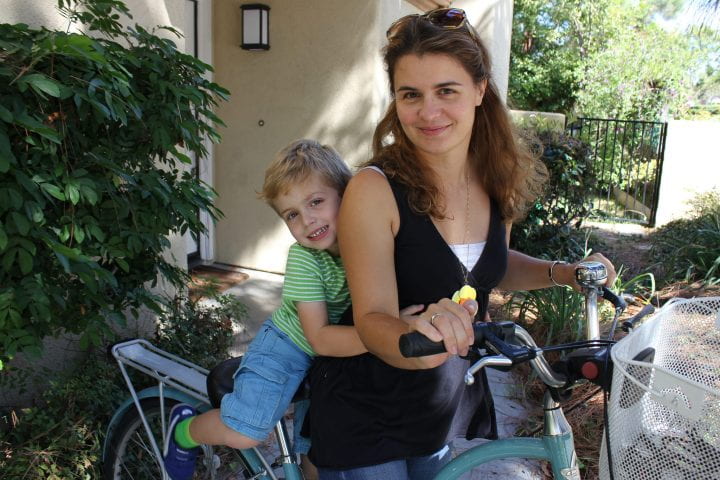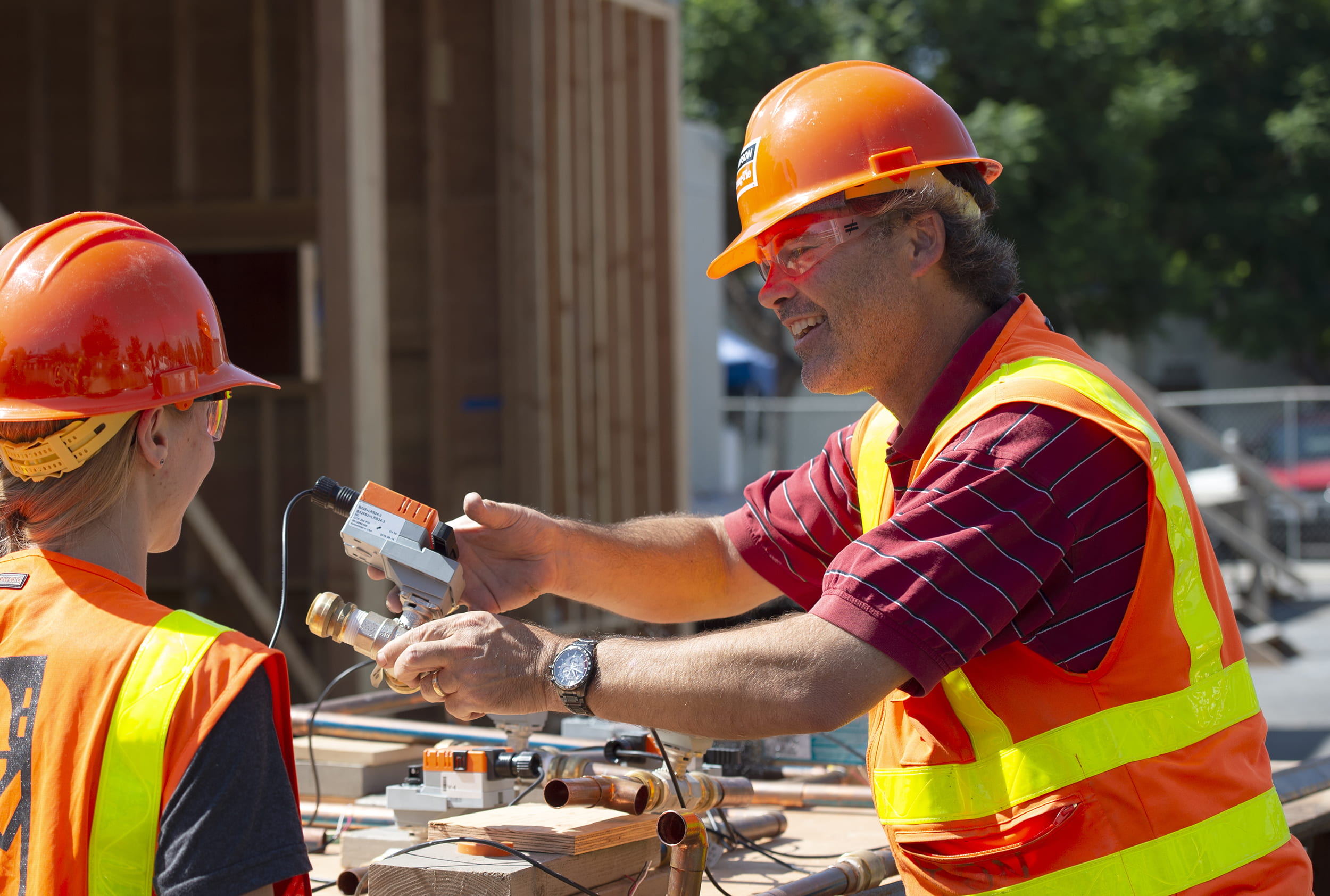A perfect balance
An engineer, professor, researcher, entrepreneur, wife and mother finds a second home at Calit2

In 2006, soon after arriving at UC Irvine, a new assistant professor was introduced to an engineering school administrator who asked what major she had chosen.
“I’m not an undergrad,” Athina Markopoulou said politely.
“Oh, you’re here for the graduate program?” inquired the woman.
“No,” answered the new hire.
Was she a postdoc then? Markopoulou explained that she was joining the electrical engineering & computer science faculty.
As the red-faced administrator learned, appearances can be deceiving. Markopoulou, who still can pass for a grad student, is now a highly regarded EECS associate professor, a well-funded researcher, an entrepreneur, a wife and mother, and an ardent and active Calit2 affiliate.
“In the beginning, it bothered me,” she says of repeatedly being mistaken for a student. “But now I’m used to it, and I think it’s fun. It can be a good icebreaker.”
Born in Athens, Greece, to high school math teachers, Markopoulou won first place in the nationwide Hellenic Mathematical Olympiad at age 14. The motivated young woman entered National Technical University of Athens in the top 1 percent of her class, choosing to study electrical engineering and computer science over math.
“Technology can make a difference; you can build things,” she says. “I started university when the Internet started booming. Engineering felt like a more happening place to be than in a math department.”
That prescient decision was a game changer. Markopoulou graduated in 1996, still in the top 1 percent of her class, and set out halfway around the world to Stanford University, where she earned master’s and doctoral degrees in electrical engineering.
Her first year of graduate school was an eye-opening experience. Markopoulou, ever the achiever, was surprised to learn that a score of 97 percent on her first programming assignment was just average.
“I had never met so many smart, ambitious people together in one place. It was humbling and incredibly motivating at the same time,” she says. “We were from so many different countries and backgrounds, but we all had in common our love for science.”
Stanford’s Silicon Valley location offered entrée into the world of high-tech, dot-com entrepreneurship and successful academic-industry partnership. Markopoulou recalls Google’s launch party, which took place on campus. “I was chatting with other students: ‘What kind of name is Google? And what new remains to be done in the area of search?’” she says, laughing at the memory.
With doctorate in hand, Markopoulou did a short stint in a large research lab; she then returned to Stanford for a postdoctoral fellowship, followed by six months at a fledgling Bay Area company. The experiences taught her something: Her heart belongs to academia. “I tried a big lab and a startup, and they were both very interesting,” she says. “But they weren’t the right places for me in the long run.”
When Markopoulou landed at UC Irvine, she immersed herself in the California Institute for Telecommunications & Information Technology, attending workshops, collaborating on grants and setting up an office in the building.
She felt at home immediately. “Calit2 has been love at first sight for me. … It’s a happening place, with activity and team projects, diverse groups of researchers, modern space and friendly staff,” Markopoulou says. “If Calit2 were a person, he/she would be ambitious, professional and fun to be around.”
“Athina exemplifies Calit2’s approach to research,” says Stu Ross, who – as the institute’s assistant director of research development – has overseen several of her grants. These include two from the National Science Foundation: a prestigious 2008 Faculty Early Career Development award and a $2 million Cyber-Enabled Discovery & Innovation award that Markopoulou and two colleagues won in 2010 for a collaboration spanning computer engineering, biology and sociology.
“She’s interdisciplinary, and she addresses basic theoretical problems as well as their practical implications,” Ross says. “She’s hardworking; she writes extremely well; she’s willing to work with private companies; and she gives priority to finding funding for her research group in addition to funding for her own research.”
The numbers speak volumes: Markopoulou has raised $5.2 million as principal investigator or co-principal investigator, $3 million of which was for her own work. “I’ve been lucky with fundraising so far – fingers crossed, I don’t want to jinx it,” she says, laughing. “But it’s not all me. There are co-PIs on those grants. And a lot of credit goes to my students. After we built critical mass in the group, things just seemed to happen on their own.”
One of those students was Hulya Seferoglu, Markopoulou’s first Ph.D. candidate. Seferoglu attributes her new faculty position at the University of Illinois at Chicago – at least in part – to her adviser’s influence. “Athina supported and guided me,” she says, encouraging her to secure relevant summer internships and attend conferences, workshops and funding meetings. “These were important steps. … I had a chance to present my work in different venues and learn different research aspects.”
Markopoulou’s own research focuses on designing, analyzing and optimizing computer networks, including network coding, online social and mobile networks, measurement and security. “I got interested in this field because it has a good mixture of theory and practice,” she says.
Last year, Markopoulou won an NSF Innovation Corps grant that helped her explore the marketability of one of her recent projects. Microcast, which grew from her NSF early-career award and an Air Force Multidisciplinary University Research Initiative award, is an application that enables mobile devices near each other to automatically share their network connections; this allows them to aggregate their bandwidth and download content much faster.
Senior Assistant Vice Chancellor for Alumni & Constituent Relations Goran Matijasevic, who’s also executive director of UC Irvine’s Chief Executive Roundtable, mentored the Microcast team during its intensive, six-week Innovation Corps training program. “I admire Athina’s technical brilliance and entrepreneurial spirit but also her willingness to learn new things,” he says. “These characteristics have contributed to her success so far and will make her even more successful in the future.”
After determining that the project did indeed have market potential, the Microcast group took the next step and launched Shoelace Wireless – named for its ability to tie mobile devices together. The team includes Anh Le, a former postdoc under Markopoulou, and Christina Fragouli, a longtime friend of Markopoulou’s currently at UCLA. The startup received a $150,000 Phase I Small Business Innovation Research grant and recently moved into Calit2’s TechPortal incubator.
“Athina has great research vision, execution and delivery. She’s very good at identifying great collaborators and giving them the best environment and support to perform,” says Le, the company’s chief technology officer.
Fragouli concurs: “Athina is an extremely smart and creative researcher. She’s very organized, motivated and determined in her pursuit of excellence.”
The high-energy dynamo says she’s learning to delegate. “I understand we can get more from a team than we can get from a single person,” Markopoulou says. “But I still spend more time than I should on all kinds of things.”
Carter Butts, a member of the team funded by the Cyber-Enabled Discovery & Innovation award, calls her “tough, sharp and no-nonsense” but also cites her generosity and strong sense of fun. “I think Athina embodies the spirit of Calit2,” says Butts, a UC Irvine sociology professor. “She combines creative and rigorous science with an engineer’s pragmatism, creating technologies that address important real-world problems.”
That pragmatism has benefits outside academia too. Markopoulou and her husband, Kristian Jessen, are parents to 4-year-old Hector, born when both were striving to earn tenure. (Jessen teaches and studies chemical engineering at the University of Southern California.) “It was a pretty stressful period for our household,” she recalls.
The trio returned recently from a sabbatical year in Denmark – Jessen’s birthplace – where both parents worked as visiting professors at Danish universities. “A colleague once said that in academia, you have the flexibility to work any 80 hours of the week you like,” says Markopoulou, grinning. But the commitment came with a bonus: Their son got to spend time with both sides of his international family. “That was important for us,” she notes.
What’s next on her agenda? At the top of the list is expanding her research efforts. “At this stage, I hope I can afford to take some risks with the topics I choose and think bigger than I could while I was trying to attain tenure,” Markopoulou says. “My favorite part of the job continues to be working with my group. Seeing them do well is very, very rewarding.”


